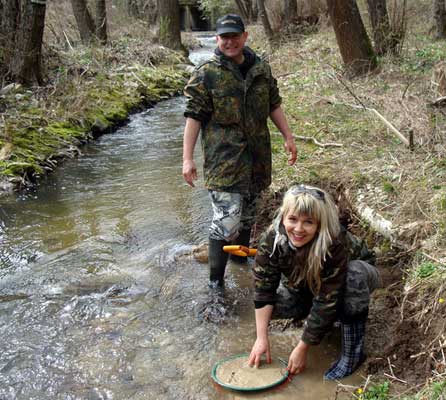Some would give their souls for it, but few have any luck. The shine of gold has always attracted and spelled people, not simply as a piece of metal, symbolizing wealth, but a test for strong will and a pure heart.
Gold has been searched for since Antiquity across the Bulgarian lands. A growing number of people have recently headed to rivers, in order to try their luck with the precious metal. Lazar Valnev has been doing it for 5 years and he tells us more on the secrets of the watercourses and also why there isn’t a rich gold-seeker in Bulgaria:
“Gold has been extracted in Bulgaria for over 6,000 years. Our rivers used to be extremely rich, though they cannot be compared to the American ones now, for instance. It is interesting to know that the Thracians extracted their gold in mines and with copper instruments. However, the Romans came afterwards – their legions used to dig huge mounds on Vitosha and a part of that gold would go for wages. Whole Macedonian families arrived along the Bulgarian rivers in the beginning of the last century and extracted gold for living. Then during WWII the Germans mapped the whole country, then the Russians did the same thing and everything was clear. Yes, we have some amounts of gold now, but the issue on the quality and concentration is a different one. That is why it is better to start it up as a hobby – if the attitude is wanna-be-a-millionaire like, it will all turn into a quick disappointment.”

A piece of romanticism because of Jack London’s books and a piece of hope for something bigger – that was how Lazar became a gold seeker. However, being an art person (he has been singing with the choir of the Sofia Opera House for over 20 years), the man has never been satisfied with the simple panning process, but he has always seen it all on a deeper level.
“The interest shown by people towards gold is very ancient and it is not a coincidence. The oldest technologically processed gold has been found in Bulgaria – in the Varna Necropolis. It is some 6,500 years old. I don’t know whether someone has somehow and somewhere inserted it in our veins, but the interest of this nation towards gold is a fact.”
Lazar says that gold seeking is an obsessive hobby, but also litmus. If a person is strong, he manages to suppress his bad side, otherwise all the negative qualities stand out. At the same time gold is also a big fraud. Some 140,000 people from America and even Europe would pawn their properties, in order to take part in the Klondike Gold Rush at the end of the 19th century. Only 300 – 400 of those got rich after all.
 Bulgarian gold seekers have increased by 400 within a year only due to poverty and now they are a total of 1,500. However, they all face an unpleasant fact – there are many goldbearing rivers and none of those has high extraction rates.
Bulgarian gold seekers have increased by 400 within a year only due to poverty and now they are a total of 1,500. However, they all face an unpleasant fact – there are many goldbearing rivers and none of those has high extraction rates.
Being a gold seeker doesn’t mean that you are a treasure hunter. The law bans digging in the ground and that is why legends on buried treasures should interest the state only. At the same time nature is for all. Some of us spend hours by the river, others look for meteorites (making really good money), while there are people, reflecting the beauty of stones. Lazar is one of them.
“My new hobby – I deal with semiprecious stones, which are incredibly beautiful, they carry some energy inside. They can be found at some places only that are charged with energy – the East Rhodope Mountain, The Sredna Gora one and across the Shumen Highlands. Thracian sanctuaries can be found very often at those places and there is always some gold around a Thracian sanctuary – undiscovered, processed or inside mines. So, things are linked together,” Lazar concludes.
English version: Zhivko Stanchev
Photos: forum.zlatoimeteoriti.bg
A Bulgarian-designed electric vessel has gained international recognition , reaching the final round of the prestigious Gussies Electric Boat Awards 2025 . The awards celebrate the world’s most innovative and sustainable electric boats and yachts,..
A case of a dog run over by a doctor in a district of Sofia has caused a wave of public indignation and a protest in Sofia, which will take place today in front of the Military Medical Academy - the medical institution where the medic..
Forty Bulgarian schools in 22 US states have become a second home for the children of Bulgarian emigrants. They create continuity between generations and teach about Bulgarian history, traditions, and culture. They also create..

+359 2 9336 661
